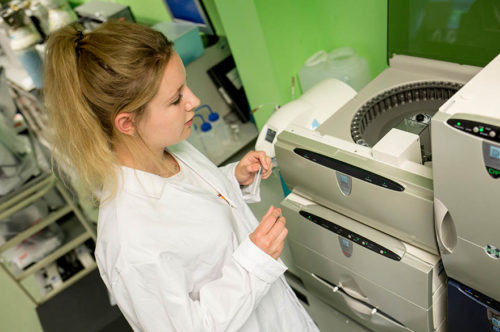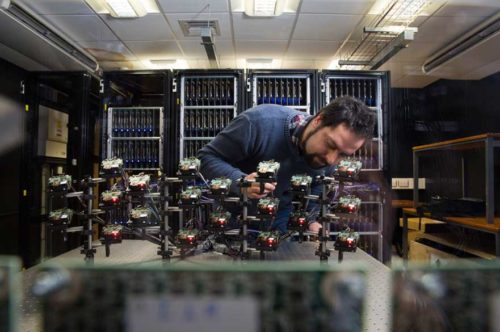Our Forensic Investigation degree allows students without a traditional science background, or those with a specific interest in this field, to acquire knowledge relating to the use of forensic techniques in a wide range of criminal investigations.
The Foundation course is for students who don’t meet the entry for the BSc (Hons) Forensic Investigation degree. You’ll start by completing a foundation year, which provides well-structured support, allowing you to develop your scientific skills and knowledge. Once you have completed, you will start the first year of the Forensic Investigation degree.
Investigations could include drugs testing, consumer protection and authenticity, DNA analysis in food testing, wildlife crime and toxicological investigations linked to chemical and biological terrorism.
You’ll gain practical skills in crime scene and courtroom simulations, as well as analysis of forensic evidence. The degree will also teach you about the structure and processes that regulate the criminal justice system, and the law associated with criminal investigation.
What you will study
You will study a diverse range of subject areas relevant to forensic investigation, including crime scene investigation, collection and analysis of evidence, the structure and processes which regulate the criminal justice system and laws associated with criminal investigation.
Foundation Year: Forensic Investigation Degree
Introduction to the Forensic Laboratory
Students will cover topics such as how to write and experimental lab report; observational skills; what are the basic essentials for a forensic lab; what can happen when evidence is compromised; introduction to quality and standards in the laboratory: requirements, regulation, failure, examples, impacts; basic health and safety; basic analytical science: what is it? How much is present?; forensic evidence composition.
Science for Law Enforcement Officers
Students will be introduced to a number of concepts, ideas and methods used to augment policing investigations including analysing DNA, Drugs, Alcohol and road traffic collisions; cyber security and forensics. You will cover topics such as legal, ethical and social issues; information security awareness concepts / confidentiality integrity and availability; social engineering; cyber hygiene; threat actors; introduction to open source cyber tools; introduction to open source intelligence and an introduction to computer forensics principles.
Introduction to Forensic Investigation
This will cover an introduction to critical thinking and the scientific process. What is an enquiry? What is an investigation? Basic processing tools and flows to solve an enquiry or investigation. Information gathering. Information analysis. Forming logical conclusions based on fact and scientific data.
You will examine forensic science as a discipline. Introduction to the core branches of forensic science, and identification of selected evidence types. The scope of forensic evidence and rules of forensic science. You will also cover case studies. Analysis of crime cases with special emphasis on investigation, the sifting and presentation of evidence and key issues raised in trials, plus key elements of Criminal Justice, the Criminal Justice system and the Courts.
Scientific Data Literacy
This module is designed to develop and support the students application of numerical literacy and data handling set in the broad context of science. It covers an introduction to quantitative science, units and measurement; the principles of basic arithmetic, BODMAS, and negative numbers; decimals and the use of significant figures, fractions, indices and scientific notation; the application of algebra and simplification/rearrangement of equations; the use of Excel, a scientists tool for manipulating data: its use to record, manipulate, analyse, and present data. I
Key Skills in Professional Development
Students will be introduced to academic life and expectations. Beginning with identifying their own strengths and weaknesses as an active learner, students will evaluate and reflect on their approach to learning and utilise new skills to improve their experience. Concepts and skills surrounding sourcing information, acknowledging the work of others, and information handling will be integrated to provide students with skills helpful for their future academic and lifelong studies.
Cyber Security and Forensics
This module allows you to develop an understanding of the key areas relating to cyber security and understand ethics relating to the protection of computer systems and data. You will also gain an awareness of tools and techniques used for digital forensics and computer security.
Year One: Forensic Investigation Degree
During the first year, you will receive an introduction to the various disciplines within the forensic science field and this will be complimented with practical experience gained through the examination of realistic simulated crime scenes from domestic burglaries to homicide within our suite of forensic laboratories and bespoke crime scene house. Other subject areas such as Policing, Health and Safety, Introductory Science and Mathematics will also be studied.
Introduction to Forensic Science
This module will provide you with a comprehensive introduction to the technical and practical aspects of selected topics within forensic science. Areas covered include forensic geology; forensic odontology and anthropology; homicide investigation; criminal profiling; forensic entomology; accident investigation; current and anticipated crime trends and legal systems in England and Wales.
Introduction to Criminalistics
The practice of forensic science requires an understanding of a broad range of forensic topics and involves many investigative techniques. This module will provide you with the knowledge, practical understanding and technical ability relating to the investigation of crime. Here you will study introduction to crime scene investigation; documentation; collection and preservation of physical evidence; interpretation of crime scene evidence and crime scene reconstruction.
Law, Governance and the Criminal Justice System
This module will introduce you to the legislative and criminal justice system of England and Wales. This will include identifying the role of the police and associated agencies, who work in this environment. You will also examine the role of governance within the policing and security environments.
Science for Forensic Investigation
Within this module you will be introduced to the concepts of scientific investigation, measurement, accuracy and essential chemical and biological theories and practices involved in forensic investigation. This will include assisting you to develop good laboratory technique within these areas, but also an introduction to chemistry, cell and molecular biology, serology, genetics and DNA.
Crime Analysis
In this module you will learn about the scientific and statistical tools used to evaluate crime along with its origin and context, prevalence, and effects upon victims and society. You will be given an overview of the classification of criminal offences and links to intelligence and evidence.
Key Skills for Forensic Practice
This module will provide you with an appreciation of the principles of safe working in laboratories, accident prevention and the promotion of safety in the workplace and the consequences for health due to exposure to hazards. You will develop an understanding of the information concerning hazards in performing experimental work and in the calculation of the probability of an accident and to estimate risk. Additionally the use of IT for scientific working, accessing journals and referencing skills are provided.
Year Two: Forensic Investigation Degree
During the second year of study, you will further enhance your skills through the analysis of evidence in the laboratory, learning about the various chemical and biological analyses that are used within forensic laboratories. Specialist disciplines such as photography, Forensic Earth Science, Computer Forensics and microscopy are introduced here.
Forensic Evidence and Laboratory Examination
Through studying this module you will gain practical experience in the examination of a variety of forensic evidence types using industry standard laboratory approaches or equipment. You will also learn the science behind examination techniques as well as the evidence itself. You will become competent in the search, recovery and examination of evidence and it’s presentation through case files and expert witness reports. The module also focuses on biological evidence and subsequent DNA analysis.
Volume Crime Scene Examination
Within this module you will gain practical digital imaging, crime scene photography and video experience recording a variety of crime scenes scenarios. This will involve studying the theoretical aspects of photography, and equipment: Films and film speeds, camera formats, focal length, aperture and depth of field, lighting techniques and flash. In addition to this, you will gain practical training in core skills for the crime scene investigator within a series of simulated volume crime scenes including vehicle examination.
Police Duties and Law II
This module will enable you to interpret and relate current and new legislation to police practice and procedures. It will allow you to identify and analyse the effects of legislation on communities and partner agencies. Students will be given the opportunity to further develop knowledge, confidence and competence in application of law as a tool for problem solving.
Digital Forensics (e-crime)
You will develop knowledge and evaluate the tools and techniques associated with the creation and delivery of a computer forensic service within a team environment. You will learn to demonstrate knowledge and skill in the processes required to manage a forensic project, from initial seizure to presenting evidence in the courtroom.
Investigative Approaches
In this module you will gain an understanding of the reactive and proactive approaches to criminal investigations. You will understand the complex nature of offender motivation and consequences for the crime scene. The module will also include an introduction to the complex field of forensic psychology and its role and uses in the criminal investigation procedure.
Practical Applications of Forensic Investigation
You will learn about the prevalence, abuse and effects and forensic examination of drugs and alcohol. This will include the sports doping, hair analysis and in the investigation of consumer products. In addition to this, you will gain an appreciation of the role of earth science data in the forensic examination of crime scenes or reported episodes.
Year Three: Forensic Investigation Degree
You will be introduced to more complex Forensic Investigation areas such as Fire and Explosion and Specialist areas of Forensic Investigation. Emphasis will still be placed on the Policing strand of the course and the importance of crime scene processing, and evidence handling in the laboratory. You will also undertake an independent literature review research project.
Research, Employability and Professional Skills
This will involve the scientific evaluation of cases and evidence and statistical evaluation of forensic evidence and professional ethics and standards. Cases will include forensic pathology, homicide, suicide and accidental death amongst others. In addition to this, you will be introduced to the court room processes and the role of the expert witness, barristers, cross-examination and evidence in chief. As part of this module, you will conduct a literature review which will involve a critical evaluation of primary information and data on a selected topic within forensic science.
Forensic Microscopy
You will develop an understanding of the optic principles involved in microscopy and appreciate the microscope as an instrument to examine and analyse specimens which are applicable to forensic science. In addition to this, you will develop a capacity to interpret images and draw conclusions from these observations. Samples may include textiles, fibres, food and drugs, soil, pollen and tissue samples. In addition to this you will gain an understanding in, and hands on experience of using the Scanning Electron Microscope.
Forensic Evidence II
You will acquire practical experience in trace evidence analyses using associated instrumentation and develop competence in case management and evidence interpretation. In addition to this, you will receive theoretical and practical instruction in traffic incidents and the use of GIS in the statistical analysis of crimes.
Police Duties and Law III
It will enable you to critically analyse complex legislation in the context of police practice and procedures. You will learn to differentiate and discriminate in analysing, summarising, interpreting and applying the nature and effects of complex legislation and it enhances knowledge, confidence and competency in the application of complex law involved in personal development and progression within policing.
Specialist Forensic Investigation
Within this module you will be provided with an understanding of a variety of specialist investigation fields including wildlife forensics, forensic engineering and the investigation of biological and radiological hazards. In addition to this, you will learn about bioterrorism and its’ investigation and wildlife forensics.
Major Scene Investigation
This module aims to allow you to develop a detailed knowledge of the forensic criminal investigation process and gain a critical understanding applied to a range of specialist and serious offences described as major incident investigations. You will apply associated learning through exposure to relevant and related simulated major scene scenarios and case studies.
Teaching
You’ll study several cases and learn about the forensic techniques used to solve the crime, and be able to critically appraise and evaluate forensic approaches.
The Forensic Investigation course will be delivered through a series of lectures, tutorials and practical classes. In addition to this, students are expected to undertake both directed and independent learning, reading around the subject area.
On an average week, students may be expected to attend the following:
- Six lectures
- Three to four hours of tutorials or workshops
- Up to 10-12 hours of practical work
- Independent directed study
The timetable may be spread over all five days of the taught week (Monday to Friday inclusive) or it may for example, allow students half a day or a full day free from contact classes. This is subject to change on a weekly basis depending upon when individual activities for modules are timetabled.
Guest lecturers are invited to speak to students on a range of topics. Previous topics have included fire investigation, ballistics cases and identification of bodies from mass graves.
Assessment
Students will be assessed by various means, including written examinations, in class tests, essays, reports, practical exercises, presentations, assessed tutorials and computer assignments. Some modules will be continually assessed and others may have an end of year examination.
Zobacz więcej na stronie uniwersytetu >>
Wiza studencka do Wielkiej Brytanii
Aby studiować w Wielkiej Brytanii potrzebujesz wizy studenckiej. Aby złożyć wniosek o taką wizę studencką musisz zdjać certyfikat językowy na poziomie B2.
Uważaj! Do celów wizowych musisz wybrać wyłącznie egzamin w wesji Secure English Language Test (SELT) UKVI .
Co to jest test SELT UK VI registration? Przeczytaj więcej o testach SELT UKVI >>










